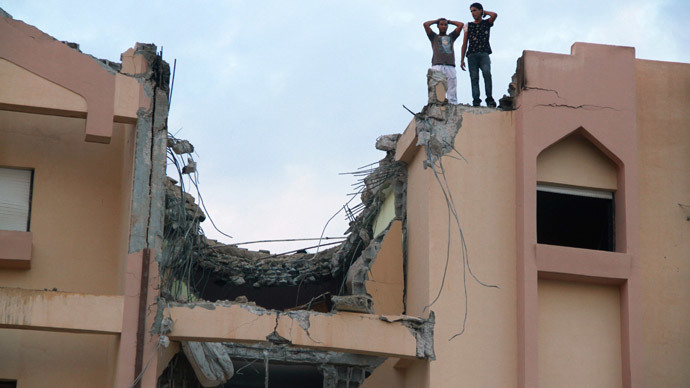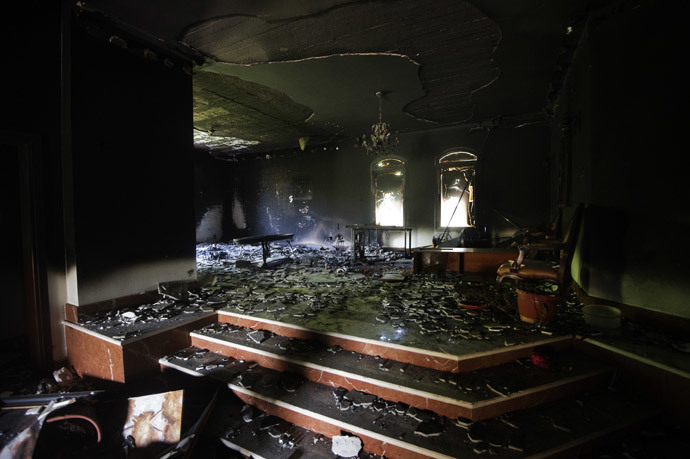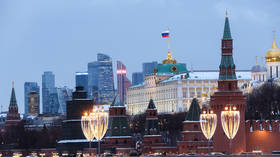How Muammar Gaddafi’s death reshaped destinies

It is 3 years since Libyan dictator Muammar Gaddafi was shot by National Transitional Council (NTC) forces. That fateful day when NATO intelligence and military assistance spelled the end of a dictator, the future of our world was reshaped forever too.
Beyond Benghazi
Most Americans have forgotten all about Gaddafi these days. As for Libya, Hillary Clinton's possible malfeasance over the Benghazi incident is all one hears now. The killing of the U.S. ambassador is now a political football for opponents of the Obama White House only. Whatever the former Secretary’s role in the Libyan Civil War may be, America’s role in the “so-called” Arab Spring is monumental by comparison.
Of the flamboyant, even notorious Colonel Gaddafi, much has been, and is, being written on this anniversary of his demise. Underneath the drama of his longstanding impact on Libya, and his antagonism of the Western allies, his “removal” needs intense scrutiny for the future impacts the event will have. Gaddafi, a symbol of extremism and some say evil on the one hand, was also a stabilizing factor across North Africa. America’s, and the United Nations’ intervention in 2011, as we see now, extended far past that desert nation’s borders. Beyond the humanitarian disaster in Libya, past the corruption, violence, and even the Western banks’ interference there, the world community needs to look at how NATO’s meddling has and will affect us all.

An Arab fireball
Regime change across the Middle East, was supposed to be a positive outcome, from the Western perspective of the Arab Spring. With the situation in Syria and Iraq today though, we have a shining example of how “intended” results can end as failed foreign policy strategies. Unless the West had intended to set the world on fire on purpose, our role in these upheavals just seems insane. ISIL as the American administration likes to refer is a manifestation of the sectarian civil war in Syria, not to mention shadowy CIA operations worldwide. For all intents and purposes, the unrest the US and NATO fostered across North Africa, has now manifested into a proxy war between the Shia of Iran, and the Sunni in Saudi Arabia, not to mention more complex and hazardous conflicts. Make no mistake, this friction between the two branches of Islam, are key to the causes of ISIL, and to America’s “new war” in Iraq as well.
For those who remember when Russian President Vladimir Putin’s mediations in late 2013 cut short the Obama administration’s Syria intervention, Arab Spring has now expanded to include Europe. In fact it can be said that the Arab Spring upheaval has begun a long term social transformation that is marked by not only political turbulence, but vast economic problems and deadly conflicts across the world. The positive change these uprisings were “supposed to” foster, have so far not ended well for citizens. The political and economic gains people in these countries foresaw when Gaddafi and others were usurped, they’re farther off than ever now. What’s worse, what America and other nations instigated, is appearing more like an Arab fireball setting aflame everything in its path, than any beacon of freedom. America is at war still, and on the threshold of world war, some insist.
An emboldened US policy spike
When the United Nations enacted Security Council Resolution 1970 sanctioning Libya and Gaddafi, a precedent was set which further emboldened Washington to escalate, to intervene. Interestingly, in the original resolution Russia insisted on the move not being used as a pretext for intervention. Also, the “no-fly zone” instituted later, which crippled Gaddafi’s forces, was initially rejected by the council.After the “no-fly” restriction was enforced, the civil war in Libya took on a complexion that mimics what we’ve seen in Ukraine. Gaddafi never recovered, the die was cast. A ceasefire continued back and forth, then shelling and civilian deaths ensued, and a general degrading of the situation in favor of what the United States and Western alliance policy realized. However, we see now the costs of one Gaddafi gone may equal tens of trillions in monetary damage, and untold human suffering.

Today Syria, Libya, Iraq and Yemen are staggered by continual civil war. In Egypt one authoritarian rule has been replaced by another. In fact, of all the nations stricken by upheaval across the region, only Tunisia seems to have survived, however tenuously. As calm as Tunis seems by comparison, just last week in Algeria, police made an unprecedented attempt to barge into the country’s ailing president’s offices. President Abdelaziz Bouteflika is a key ally in US efforts to battle terrorism in Africa’s largest country.Countries to the south bordering the North Africa nations have been negatively affected as well. The Central African Republic (CAR), Sudan, and South Sudan, appear ready to explode. According to global risk analytics firm Maplecroft, all out war may be on the horizon now in several sub-Saharan nations.
So, if United States foreign policy under Bush and Obama has focused on worldwide upheaval, then the world we live in today is a symbol of superior leadership thinking and intellect. Otherwise, suggestions we’re led by mad men, seem more feasible. As a consequence of US interference in the world, hundreds of millions are now impacted negatively. Afghanistan to Tehran and Timbuktu. This anniversary of Muammar Gaddafi’s execution begs the question; “Was Libya and the world better off with him?” As crazy as that sounds, American taxpayers funding genocide in Gaza at the hands of the Israelis, or promoting the shelling of civilians from Damascus to Donetsk, it is utter madness. Whether the Obama administration is arrogant and emboldened, or simply mediocre and incompetent, the effect on the world is the same. Not many are freer than before Gaddafi died, that’s for certain.
Arab Spring turns to Worldwide Winter
Please don’t think for a moment the Arab Spring was simply about some far off Arabs in unnamed deserts, this Independent article in February of this year compares Syria and Ukraine, as paralleling geo-political conflicts. By now most reasoning individuals understand US policy is nothing if not focused on adversarial relationships. Just why the United States now treats most nations as either outright enemies, or at best rivals, is anyone’s guess. Where trust in the US is concerned though, even the EU now suffers from doubt. Sanctions mimicking those imposed on Gaddafi, enacted against Russia over speculation alone, they’ve cost Europeans dearly. Add to this the lost opportunities had the US and EU followed through on promises to North African nations economically, and you’ve a chaotic recipe for worldwide economic disaster. The EU lost a huge opportunity not investing in Arab Spring affected countries. Now decades of instability will likely follow. NATO and the UN blew it, at the behest of the Obama administration.

Finally, if the Benghazi Select Committee investigating Hillary Clinton is for real, then Washington politicians had better broaden their detective work to discover how this administration has affected our world posture overall. Has the will of the people been served? Was our involvement in Arab Spring in the best interests of the people of the United States? When one of the world’s most controversial and highly divisive leaders represents more stability than American democracy does, it’s high time people of the world examine our definition of democratic reform. Instigating wars, funding future terrorists, endlessly attempting police actions around the world, this in no way resembles free republics of any sort. Defending freedom is one thing, assassinating stability in favor of chaos and impoverishment is quite another.
I was taken last week by an interview given to CNBC by Russian Prime Minister Dmitry Medvedev. In the interview Medvedev was characteristically straightforward in saying; “a reset of relations with the United States is impossible.” The PM also made the statement about US President Obama’s speech before the UN General Assembly in which he labeled Russia a key threat, second only to the deadly Ebola virus and ahead of the terrorist threat posed by Islamic State. Medvedev called the speech commentary; “sad, it's like some kind of mental aberration.”
Let me end by saying Americans once thought Muammar Gaddafi unstable or insane for his peculiar brand of authoritarian rule. Now my country makes enemies faster than friends, in a world dominated by news of death, disease and chaos. When Gaddafi was alive, back in 2010, the Obama White House sought a relations “reset” with Russia which was highly publicized. It appears to me NATO expansionism has signaled a betrayal of the treaties signed there. So who can blame Medvedev for wondering? Even insanity has to be considered when the world goes insane.
Phillip Butler for RT
Phil Butler is journalist and editor, and a partner at the digital marketing firm, Pamil Visions PR. Phil contributes to the Huffington Post, The Epoch Times, Japan Today, and many others. He's also a policy and public relations analyst for Russia Today, as well as other international media. You can find Phil's blog at http://www.phillip-butler.com.
The statements, views and opinions expressed in this column are solely those of the author and do not necessarily represent those of RT.
The statements, views and opinions expressed in this column are solely those of the author and do not necessarily represent those of RT.












